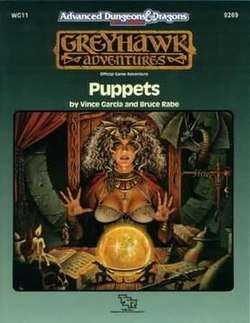Puppets (module)
Puppets is an adventure module published in 1989 for the Dungeons & Dragons fantasy role-playing game.
 | |
| Code | WG11 |
|---|---|
| Authors | Vince Garcia and Bruce Rabe |
| First published | 1989 |
Plot summary
The module details a linear, cross-country, convoy-guard adventure.[1] In part one of the scenario, the player characters battle an evil leprechaun in Gnarley Wood.[2]
In part two, which is set in the Free City of Dyvers, the characters must solve the mystery of the tiny burglars.[2] This small-town adventure takes place as the PCs hunt for clues to the plot's central mystery.[1]
Publication history
WG11 Puppets was written by Vince Garcia and Bruce Rabe, and was published by TSR in 1989 as a 32-page booklet with an outer folder.[2] Editing and development was done by Jim Lowder.[1]
Puppets was adapted from two scenarios previously run as RPGA (Role Playing Game Association) tournaments.[1][2]
Reception
Ken Rolston reviewed Puppets for Dragon magazine in July 1991.[1] Rolston declared both scenarios "competently presented and playable", saying their primary appeal comes from three very good ideas that he felt could be freely exported into other scenario and adventure settings.[1] He declines to identify these "cheap tricks" to prevent spoilers, but notes that the first two are "humorous and whimsical" encounters along the road in the convoy adventure, and that the third is the central plot element of the town adventure and the title concept of the module: "The concept is clever, an idea you can take and run with or present as concisely as session time and interest permit."[1] He called the adventure designs "sound and reliable, easily scanned and presented by experienced DMs."[1] He said less-experienced DMs, or ones who were not good at improvisation, might have more difficulty getting use out of the adventure, continuing, "The town adventure's middle game is either pretty sketchy or appealingly open-ended, depending on how you feel about such things."[1] He noted that the DM improvises a lot of informant NPC personalities, and that the system for handling the NPCs and clues "looks a bit cheesy, but it's actually just the sort of thing that skilled NPC improvisers will love".[1] He also says that the action elements are "exceptionally compact and concise—again, just the way many DMs like it".[1] Rolston concluded the review by stating, "These make a pair of very good adventures that are easily adapted to other settings, with nifty plot and encounter elements, abundant opportunities for clever play, and plenty of juicy character roles for the DM."[1]
References
- Rolston, Ken (July 1991). "Role-playing Reviews". Dragon. Lake Geneva, Wisconsin: TSR (171): 85.
- Schick, Lawrence (1991). Heroic Worlds: A History and Guide to Role-Playing Games. Prometheus Books. p. 117. ISBN 0-87975-653-5.